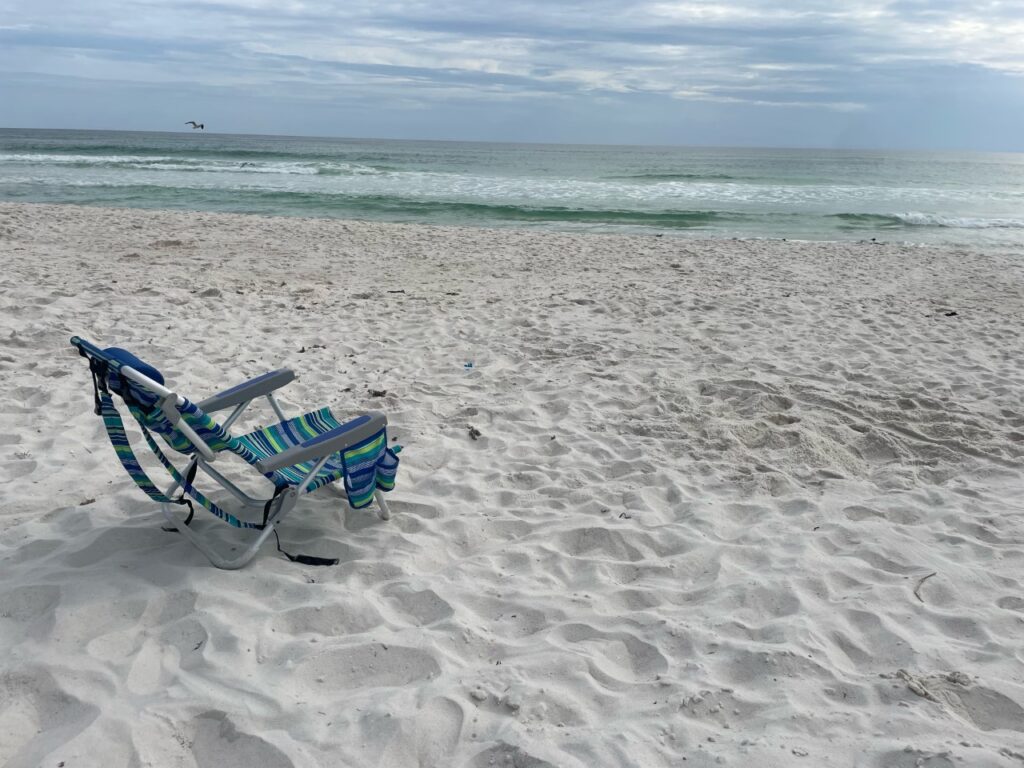
A beach chair turned into a presumptive chair for me this week. My family and I just got back from our spring break trip to Panama City Beach, Florida. On Vacations, I am generally the first one to wake in the morning. Instead of shuffling around the condo and stirring others on this particular trip, each day I would drive to McDonald’s, grab a cup of coffee, go the beach, set up my beach chair, and read.
Another routine I added is that I would carry our other chair and umbrella out to the beach afterwards to mark our spot for the day. Then, I would go to the condo and head back out to our spot when everyone else was ready.
Our last full day at the beach was Friday. Instead of sticking with my routine that day, I decided to change something. I would only bring my chair down to mark our spot. The beach was fairly vacant at that point in the day. So instead of walking a mere 1,000 feet back to the truck to get the other chair and umbrella when I finished reading, I took the easy route. I just set up my one chair to stake our spot.
When we showed back up to the beach for the remainder of the day, the chair was gone. So, immediately I went to making presumptions. I had two decisions to make, to presume the worst or presume the best. Here are how both correlates to how we lead in the workplace:
Presume The Worst
Webster’s Dictionary defines presume as, “to suppose to be true without proof.” My immediate inclination was to go towards the thought that someone stole it. Although, to presume theft was not far fetched. Don’t judge, you probably would too!
That presumption stirred anger in me that would carry over into the rest of my morning. I quickly forgot the content of my morning read, the taste of a good cup of coffee, and the beautiful view from that peaceful morning on the beach. All I could think about was, “Why would someone do this?” I presumed.
In leadership, things happen, people fail us. The more things that happen, the more people that fail us, we tend to presume the worst. In order to avoid this, we have to give The Gift of Grace for the intention of those that fail. Did they intend to fail, or did they fail in the effort of trying? The answer to this question can help caution us in our minds going towards the worst. Don’t always presume the worst.
Presume the Best
Presuming the best does not always come natural to me. Some of us are wired in such a way that we will jump to the worst-case scenario before evaluating the positive possibilities. My tendency is to be cynical, others tend to look at life through rose colored classes. At times, I envy that perspective, I appreciate their optimistic view of the world.
Could I have looked at this circumstance differently? What if the chair went missing because someone’s job was to clear the beach every morning of anything that could have been left on the beach the night before? Maybe, just maybe they were just doing their job? Could someone have thought it was their friend’s and was going to bring it to them? What if someone could have simply needed the chair way more than I did? I don’t know the answer to any of these questions and I never will.
Leaders must remain cautiously optimistic towards the good. Believing the good in others can seem to leave us vulnerable to the consequences of doing so. It is where we must start though. We cannot adequately guide and inspire others if we do not believe the best in them. Always presume the best.
Conclusion – Presume it’s Me
There was a third option of presumption I eventually exercised. Probably the best thing that I could have done was walked my lazy butt 1,000 feet back to the truck I would still have a chair. I should have replicated my routine from the previous mornings, went back and got the other chair and umbrella, and set them up. I took a shortcut. Having the two chairs and an umbrella sure looked like a set up for the day than an out of place chair up for grabs. Instead, I made a poor choice.
THE hardest thing in leadership is to take a look in The Mirror. Our own index fingers have a natural tendency to point towards others when things go bad. When things go wrong, great leaders pat themselves on the chest. We claim it, we own it, we say, “my bad.” When circumstances happen, always presume it’s me first, then work from there.
I write this because I have always believed that self-awareness is one of the most important leadership traits that one can possess. My beach chair went missing because I presumed no one would take it. I presumed that a single chair sitting in the middle of the beach signified to others that a family would be using the area later.
Leaders should never presume the worst; believe the best or take responsibility.